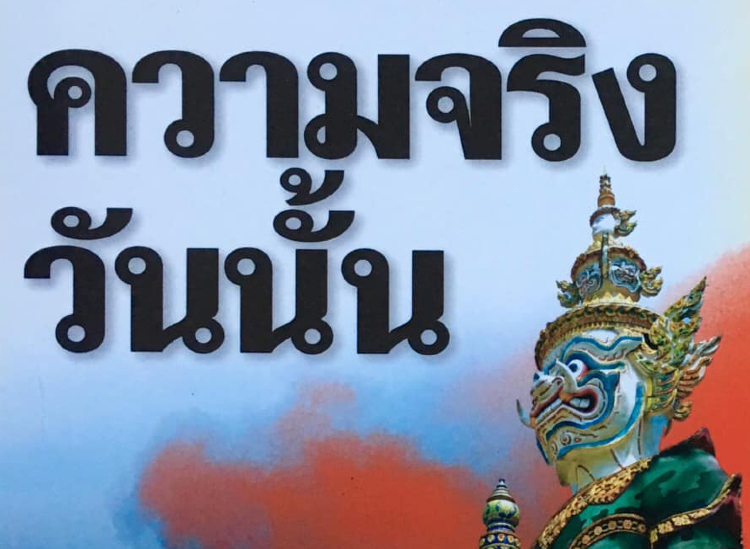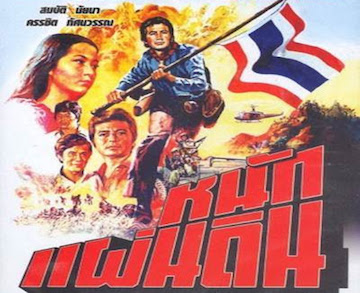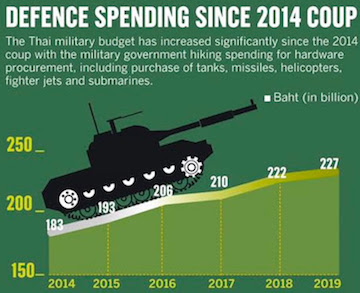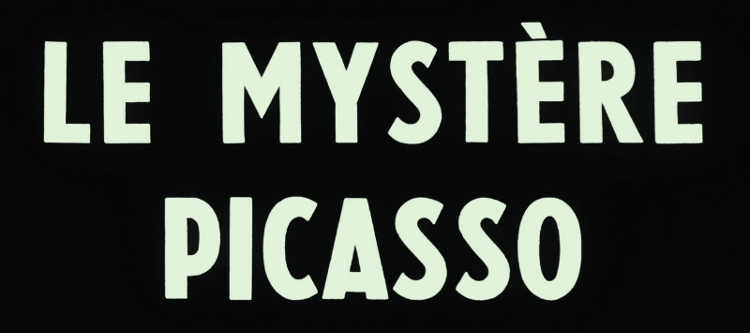Atta includes a less graphic study for Moral Boundary (ชาย-ผ้าเหลือง), and two preparatory sketches for Perceptless: สันดานกา ('native') and The Bad Monks (ภิกษุสันดานกา). There are also several new paintings, including Double Life (คู่จิ้นจีวรหลุด) and The Undercover (ใต้ผ้ากาสาวพัสตร์). Double Life depicts two monks in an embrace, and The Undercover is a portrait of a monk exposing himself; both were painted directly onto saffron robes. The folio-sized exhibition catalogue was edited by Wanida Rujikietkumjorn.
12 March 2019
Atta
Atta includes a less graphic study for Moral Boundary (ชาย-ผ้าเหลือง), and two preparatory sketches for Perceptless: สันดานกา ('native') and The Bad Monks (ภิกษุสันดานกา). There are also several new paintings, including Double Life (คู่จิ้นจีวรหลุด) and The Undercover (ใต้ผ้ากาสาวพัสตร์). Double Life depicts two monks in an embrace, and The Undercover is a portrait of a monk exposing himself; both were painted directly onto saffron robes. The folio-sized exhibition catalogue was edited by Wanida Rujikietkumjorn.
11 March 2019
Sunset Boulevard
“The act is deemed hostile to the constitutional monarchy...”

On 7th March, as was widely predicted, the Constitutional Court voted to dissolve the Thai Raksa Chart party and ban its executives from political office for ten years. The party had caused a sensation on 8th February by nominating Princess Ubolratana as its candidate for prime minister in the election to be held on 24th March. The nomination was followed by another unprecedented bombshell later that day, when King Rama X issued a statement condemning his elder sister’s involvement in politics. On 13th February, the Election Commission ruled that the nomination was invalid, and recommended the party’s dissolution to the Constitutional Court.
In the court’s verdict, announced on live television, judge Taweekiat Meenakanit severely criticised Ubolratana’s nomination: “The act is deemed hostile to the constitutional monarchy.” He also described it as a “devious scheme”. Thai Raksa Chart is the third party affiliated with Thaksin Shinawatra to be disbanded by the Constitutional Court, after Thai Rak Thai in 2006 and the People Power Party in 2008.
In the court’s verdict, announced on live television, judge Taweekiat Meenakanit severely criticised Ubolratana’s nomination: “The act is deemed hostile to the constitutional monarchy.” He also described it as a “devious scheme”. Thai Raksa Chart is the third party affiliated with Thaksin Shinawatra to be disbanded by the Constitutional Court, after Thai Rak Thai in 2006 and the People Power Party in 2008.
ความจริงวันนั้น

ความจริงวันนั้น (‘the truth about that day’), compiled by the Daily World Today (โลกวันนี้) newspaper, was published in 2010. It includes articles and colour photographs documenting the 2010 red-shirt protests and massacre in Bangkok. The book also includes a VCD, ความจริงประเทศไทย (‘the truth about Thailand’).
สมุดภาพแห่งความทรงจำ
Several other albums and singles have been recorded in commemoration of the 14th October incident. Phanom Suksaeng's single 14 ตุลาคม เลือดไทยสามัคคี ('14th October: Thai blood and unity') was released shortly after the event. The band Caravan contributed to the album รวมบทเพลงเพื่อชีวิต 14 ตุลาคม 16 ('compilation of songs for life: 14th October '73'), which included two Caravan songs—and one by another band, กรรมาชน (‘workers’)—that were banned by the Interior Ministry in 1975 for potentially inciting anti-government protests. Caravan's albums ตุลา-คม ('sharp October') and 30 ปี คีตนุกรม 14 ตุลา ('30 years: collection of 14th October songs') mark the twenty-fifth and thirtieth anniversaries of the protests, respectively. The album ตุลาธาร ๑๔ คน ๑๔ เพลง ต้องห้าม ('October: 14 people, 14 forbidden songs') also commemorates 14th October, though it includes one song—6 ตุลา ('6th October') by Pongsit Kampee—about the 6th October 1976 massacre. Euthana Mukdasanit adapted Kiss of the Spider Woman (จุมพิตนางพญาแมงมุม) as a stage musical in 2001, during which he projected archive footage of 14th October followed by a list of the victims.
Artists have also been inspired by the massacre. An exhibition of art inspired by the incident, 14 ตุลา ผ่านสายตาศิลปิน ('14th October through artists' eyes', 2003), included Tang Chang's self-portrait depicting the artist's bloodstained face and chest. Pratuang Emjaroen's painting Dhama and Adhama (ธรรมะ-อธรรม) (1974) depicts bullet holes on the Buddha's face. Amnard Yensabye's painting ภาพคนเดือนตุลาคม 2516 (picture of October 1973) is a semi-abstract depiction of the massacre's chaotic aftermath. Sanya Wongaram's woodcut The Ten Days, which depicts soldiers and students, was inspired by press photographs of the massacre.
The United Artists’ Front of Thailand (แนวร่วมศิลปินแห่งประเทศไทย), formed in the aftermath of 14th October, organised an outdoor exhibition of political billboards along Bangkok’s Ratchadamnoen Avenue in 1975. The group promoted socially-conscious ‘art for life’ (‘ศิลปะเพื่อชีวิต’), in parallel with the ‘songs for life’ (‘เพลงเพื่อชีวิต’) movement of bands such as Caravan. (The ‘art for life’ slogan was inspired by Chit Phumisak’s book ศิลปะเพื่อชีวิต ศิลปะเพื่อประชาชน/‘art for life and art for the people’.) Two Artists’ Front retrospective exhibitions have been held at the Pridi Banomyong Institute, both featuring newly commissioned replicas of the 1975 billboards: Political Cut-out Artworks of the October Event (ภาพศิลปะคัทเอาท์การเมืองเดือนตุลา) in 2003 (curated by Nonglak Laowor) and ภาพคัตเอาท์การเมืองเดือนตุลา (‘October political billboard artworks’) from 3rd–20th October 2009.
The Washington Post

Last week, Johnny Depp filed a defamation lawsuit against his ex-wife, Amber Heard. Depp is seeking $50 million in damages for an op-ed Heard wrote in The Washington Post on 19th December last year, headlined “A transformative moment for women”. In the article, published on p. A21, Heard referred to her own experience as an abuse victim—“two years ago, I became a public figure representing domestic abuse”—though she did not name Depp directly.
09 March 2019
Chinatown

Roman Polanski’s masterpiece Chinatown will have a rooftop screening tomorrow night at the Bangkok bar Smalls. Chinatown is a classic example of neo-noir, and one of the greatest New Hollywood films.
28 February 2019
Thailand Casino
The exhibition's centrepiece is an installation featuring busts of Prayut and former PM Thaksin Shinawatra playing a high-stakes poker game for the future of Thailand. The installation is replete with symbolic references to the country's political, royal, and military power structures. Prayut is concealing the four of clubs and four of spades, a reference to his unlimited authority under article 44. The cards on the table include the nine of clubs (Rama IX) and ten of hearts (Rama X).
Behind Thaksin's bust is 8th Feb '19, a calendar marking the extraordinary day when one of Thaksin's proxy parties nominated Prince Ubolratana as its candidate for prime minister in the upcoming election. Prayut's backdrop is a map of Thailand featuring the word โกง ('cheat'). Merchandise on sale at the gallery includes the election campaign slogan "STOP DICTATORSHIP", though as the exhibition makes clear, the game is rigged: while Thaksin has more chips (indicating his personal wealth), Prayut has numerous hidden cards.
27 February 2019
"contemptuous by reason of
it scandalising the Court..."
The reporting restrictions effectively amounted to a superinjunction, as even the existence of the gagging order could not be reported. On the day after Pell's conviction, the Sun Herald newspaper ran the banner headline "CENSORED" on its front page, describing the case in general terms as "a very important story that is relevant to Victorians." Similarly, other news outlets referred to the conviction of a high-profile figure on unspecified charges.
The restrictions were lifted yesterday, after Pell's second trial was dismissed, though DPP Kerri Judd warned journalists that they faced "substantial imprisonment" for contempt. In letters to individual reporters, she claimed that indirect coverage of the case had "a definite and real tendency to interfere with the administration of justice and therefore constitutes sub judice contempt, is contemptuous by reason of it scandalising the Court, and aided and abetted contempts by overseas media".
26 February 2019
Wonder Women
25 February 2019
Clouzot Retrospective
The Mystery of Picasso will be shown at the Thai Film Archive in Salaya on 10th March. It will have an extended run at Warehouse 30's Doc Club Theater, screening on 8th, 10th, 14th, 16th, 19th, 22nd, 25th, 29th, and 31st March; 1st, 5th, 10th, 12th, 13th, 16th, 18th, 21st, 25th, and 29th April; and 3rd and 10th May. (It played last week at Smalls, and in 2013 at TCDC.) The Wages of Fear will be screened on 9th March at two venues: the Thai Film Archive and Cinema Oasis. (It was also shown at the Archive last year, and at Alliance Française in 2017.) Diabolique is at the Thai Film Archive on 10th March and at Bangkok Screening Room on 13th March. (It was screened at Alliance Française last year.)
20 February 2019
“The most hateful song in Thai political history...”


Army chief Apirat Kongsompong invoked arguably the darkest period in Thailand’s history earlier this week, when he recommended a song associated with violence and intolerance. At a press conference on 18th February, General Apirat was asked to comment on the Pheu Thai party’s manifesto pledge to reduce military spending after the 24th March election. In response, he said that they should listen to หนักแผ่นดิน (‘burden of the land’). He then issued an order for military radio stations to play the song, though the directive was rescinded shortly afterwards.
หนักแผ่นดิน, composed by Boonsong Hakritsuk in 1975, denounces anyone not affirming their loyalty to the nation, religion, and monarchy as traitorous ‘scum of the earth’. This ultranationalist song fomented anti-Communist violence when it was repeatedly broadcast in the days before the 6th October 1976 massacre. In an editorial today, the Bangkok Post accuses Apirat of “reviving the most hateful song in Thai political history”.
The song was also the theme tune to a film of the same name, directed by Sombat Methanee in 1977. The Village Scouts, a paramilitary group that instigated the 1976 massacre, are the heroes in this anti-Communist propaganda movie, and หนักแผ่นดิน is their anthem. (Rachel V. Harrison discusses this and similar films in a chapter of Cultures at War.) Apirat’s invocation of หนักแผ่นดิน despite (or because of) its incendiary legacy sends a disturbing signal that the army has barely changed in the past forty years. (Apirat’s father, General Sunthorn, led the coup that resulted in the 1992 ‘Black May’ massacre. The apple didn’t fall far from the tree.)
Apirat’s resurrection of such a divisive song has overshadowed the issue of military spending that Pheu Thai highlighted. As The Nation reveals today, the military’s budget has increased by almost a quarter since the 2014 coup. Much of this money has been spent on sophisticated equipment that is largely redundant. (Paul Chambers and Napisa Waitoolkiat discuss military expenditure and corruption in Khaki Capital.)
หนักแผ่นดิน, composed by Boonsong Hakritsuk in 1975, denounces anyone not affirming their loyalty to the nation, religion, and monarchy as traitorous ‘scum of the earth’. This ultranationalist song fomented anti-Communist violence when it was repeatedly broadcast in the days before the 6th October 1976 massacre. In an editorial today, the Bangkok Post accuses Apirat of “reviving the most hateful song in Thai political history”.
The song was also the theme tune to a film of the same name, directed by Sombat Methanee in 1977. The Village Scouts, a paramilitary group that instigated the 1976 massacre, are the heroes in this anti-Communist propaganda movie, and หนักแผ่นดิน is their anthem. (Rachel V. Harrison discusses this and similar films in a chapter of Cultures at War.) Apirat’s invocation of หนักแผ่นดิน despite (or because of) its incendiary legacy sends a disturbing signal that the army has barely changed in the past forty years. (Apirat’s father, General Sunthorn, led the coup that resulted in the 1992 ‘Black May’ massacre. The apple didn’t fall far from the tree.)
Apirat’s resurrection of such a divisive song has overshadowed the issue of military spending that Pheu Thai highlighted. As The Nation reveals today, the military’s budget has increased by almost a quarter since the 2014 coup. Much of this money has been spent on sophisticated equipment that is largely redundant. (Paul Chambers and Napisa Waitoolkiat discuss military expenditure and corruption in Khaki Capital.)
19 February 2019
“Such action must be deemed transgression...”

8th February was one of the most extraordinary days in Thailand’s political history. That morning, in the first of the day’s unprecedented developments, the Thai Raksa Chart party formally nominated Princess Ubolratana as its candidate for prime minister ahead of the 24th March election.
The nomination caused an immediate sensation, as it indicated an apparent deal between Ubolratana (and, by extension, the royal family) and Thaksin Shinawatra. Thaksin is loathed by Thai royalists, and Ubolratana’s association with Thai Raksa Chart, a party linked to Thaksin, caused profound shock. Prime Minister and coup leader Prayut Chan-o-cha had long been expected to contest the election himself, and Ubolratana's nomination immediately put his political ambitions in doubt.
The junta’s constitution allows the military to appoint all 250 members of the Senate, gives senators the right to vote for the prime minister, and permits a non-politician to be PM. With 250 votes from the Senate, Prayut would require only 126 additional votes from the 500 elected MPs. The constitution also introduced a proportional representation system, designed to prevent a single party (namely, Thaksin’s Pheu Thai) from achieving a landslide.
Parties controlled by Thaksin have won every election since 2001. The 2006 and 2014 coups were both launched with the express purpose of eradicating his influence, though Pheu Thai remains one of the main contenders in the upcoming election. Thai Raksa Chart, led by former Pheu Thai politicians backed by Thaksin, was created as part of a pincer movement: a potential Pheu Thai and Thai Raksa Chart coalition that could subvert the constitution’s restrictions on an absolute Pheu Thai majority.
Even if Thaksin’s strategy had succeeded, the Senate votes would almost certainly ensure that Prayut remained PM. Hence the remarkable nomination of Princess Ubolratana: Thaksin recognised that Prayut could not be seen to challenge a member of the royal family. (Ubolratana became a commoner in 1972 in order to marry an American. After their divorce, she resumed her royal engagements, albeit without a formal title.)
At first, the bombshell announcement seemed like a masterstroke. However, by the evening, it looked more like political suicide. King Vajiralongkorn, Ubolratana’s brother, issued a written statement confirming his unequivocal disapproval of her nomination: “Any attempt to involve a high-level member of the Royal Family in the political process—by whatever means, would be tantamount to breaching time-honoured royal traditions, customs and national culture. Such action must be deemed transgression and most inappropriate.”
The King’s intervention was as unprecedented and unexpected as Ubolratana’s. In addition to instantly terminating the nomination, it publicly signalled that Thaksin remained persona non grata. (The statement also noted that legal immunity, constitutionally granted only to the King, could apparently be extended at his discretion: “Such provisions should no doubt apply to the Queen, the heir to the throne, and those members of the Royal Family close to the person of the Monarch”.)
Following the King’s statement, the Election Commission recommended that the Constitutional Court dissolve Thai Raksa Chart. The court is currently considering the case, though it has previously dissolved two other parties run by Thaksin (Thai Rak Thai and the People Power Party).
The nomination caused an immediate sensation, as it indicated an apparent deal between Ubolratana (and, by extension, the royal family) and Thaksin Shinawatra. Thaksin is loathed by Thai royalists, and Ubolratana’s association with Thai Raksa Chart, a party linked to Thaksin, caused profound shock. Prime Minister and coup leader Prayut Chan-o-cha had long been expected to contest the election himself, and Ubolratana's nomination immediately put his political ambitions in doubt.
The junta’s constitution allows the military to appoint all 250 members of the Senate, gives senators the right to vote for the prime minister, and permits a non-politician to be PM. With 250 votes from the Senate, Prayut would require only 126 additional votes from the 500 elected MPs. The constitution also introduced a proportional representation system, designed to prevent a single party (namely, Thaksin’s Pheu Thai) from achieving a landslide.
Parties controlled by Thaksin have won every election since 2001. The 2006 and 2014 coups were both launched with the express purpose of eradicating his influence, though Pheu Thai remains one of the main contenders in the upcoming election. Thai Raksa Chart, led by former Pheu Thai politicians backed by Thaksin, was created as part of a pincer movement: a potential Pheu Thai and Thai Raksa Chart coalition that could subvert the constitution’s restrictions on an absolute Pheu Thai majority.
Even if Thaksin’s strategy had succeeded, the Senate votes would almost certainly ensure that Prayut remained PM. Hence the remarkable nomination of Princess Ubolratana: Thaksin recognised that Prayut could not be seen to challenge a member of the royal family. (Ubolratana became a commoner in 1972 in order to marry an American. After their divorce, she resumed her royal engagements, albeit without a formal title.)
At first, the bombshell announcement seemed like a masterstroke. However, by the evening, it looked more like political suicide. King Vajiralongkorn, Ubolratana’s brother, issued a written statement confirming his unequivocal disapproval of her nomination: “Any attempt to involve a high-level member of the Royal Family in the political process—by whatever means, would be tantamount to breaching time-honoured royal traditions, customs and national culture. Such action must be deemed transgression and most inappropriate.”
The King’s intervention was as unprecedented and unexpected as Ubolratana’s. In addition to instantly terminating the nomination, it publicly signalled that Thaksin remained persona non grata. (The statement also noted that legal immunity, constitutionally granted only to the King, could apparently be extended at his discretion: “Such provisions should no doubt apply to the Queen, the heir to the throne, and those members of the Royal Family close to the person of the Monarch”.)
Following the King’s statement, the Election Commission recommended that the Constitutional Court dissolve Thai Raksa Chart. The court is currently considering the case, though it has previously dissolved two other parties run by Thaksin (Thai Rak Thai and the People Power Party).
12 February 2019
The Mystery of Picasso

Henri-Georges Clouzot's documentary The Mystery of Picasso (Le mystère Picasso) will be shown on 17th February on the rooftop at Smalls in Bangkok. The documentary was previously shown at TCDC, and Clouzot also directed the classic suspense thriller Les diaboliques.
06 February 2019
World Class Cinema
04 February 2019
BKKSR Cinémathèque

This week, Bangkok Screening Room is launching BKKSR Cinémathèque, a monthly programme of classic French films. The inaugural film is François Truffaut’s The 400 Blows (Les quatre cents coups), showing on 7th, 9th, 10th, 12th, 13th, 15th, 16th, and 17th February.
02 February 2019
"The secret life of Melania..."
The lawsuit relates to the cover story from The Telegraph Magazine, published on 19th January. The article, by Nina Burleigh, appeared on pages fourteen to twenty, and was based on her book Golden Handcuffs: The Secret History of Trump's Women, which was released in the US last year. (The book's publishers avoided a lawsuit, as American libel law requires proof of 'actual malice', a high bar intended to protect freedom of speech.)
The article was reprinted by the Irish Sunday Independent on 20th January, on page twenty. It has since been deleted from the Telegraph and Independent's websites, and is "suppressed for editorial and/or legal reasons" on the PressReader digital archive.
Ironically, following the Telegraph's retraction, Burleigh has also filed a defamation case against the newspaper, claiming that its apology damaged her journalistic reputation. Yesterday, in a letter to the Telegraph Media Group (TMG), her lawyer argued that "fear of Mrs Trump's lawyer Mr Harder, "the Gawker slayer", caused TMG to capitulate abjectly". This is a reference to Charles Harder, who represented Hulk Hogan in a privacy lawsuit that bankrupted the Gawker website. Harder also won $3 million in damages from the Daily Mail in a previous Melania Trump defamation case.
01 February 2019
Bencharong
The first chapter is a largely unnecessary account of Thailand's early development and Sino-Thai relations. Chapter two describes the origins of Bencharong, and chapter three explains the technical aspects of its production. The book's main interest lies in chapters four, five, and six: illustrated examples of a wide range of Bencharong decorative motifs and objects, with extended captions.
26 January 2019
Touch of Evil
22 January 2019
More or Less
On closer inspection, the ballot papers are a parody of recent Thai political factions, and a Thai flag backdrop is overlaid with army camouflage to indicate the military's pervasive influence over the country. Also, the ballot box has no bottom, so ballot papers fall straight onto the floor, symbolising the futility of elections that are often invalidated (as in 2006 and 2014) or postponed. According to the junta, a return to democracy is always on the horizon, and elections are perpetually due 'next year'. In the meantime, gallery visitors can vote via Januário's ballot papers.
A month after the coup, on 28th June 2014, Prayut Chan-o-cha promised an election by October 2015. On 9th February 2015, he committed to an election by February 2016. On 9th August 2016, he announced that an election would take place by November 2017. On 10th October 2017, he gave assurances that an election would happen by November 2018. On 27th February 2018, he pledged an election by February 2019, though another delay seems inevitable.
صح النوم
(‘wake up’)
A presenter on an Egyptian satellite television station has been jailed for a year, after being found guilty of inciting immorality. Mohamed al-Ghiety’s talk show, صح النوم (‘wake up’), featured a gay man discussing his sex life in an episode transmitted on 5th August last year. (The man’s face was blurred to disguise his identity.) The broadcaster, LTC TV, was suspended for a fortnight after the programme was aired.
20 January 2019
Monstrous Phenomenon
A four-leaf clover is considered lucky, though five-leaf ones certainly aren't: they are genetic mutations caused by nuclear radiation. The exhibition features these and other plant and animal specimens from contaminated sites in Fukushima prefecture, including a bee from Minamisoma and a bovine lumbar vertebra from Namie.
Monstrous Phenomenon runs until 19th March at 1Projects. Ruangsak's sculpture 'Transformations' was included in ห้องเรียนวาฬไทย at HOF Art Space, and his 'Ash Heart Project' installation was part of the Dialogues exhibition at BACC.
18 January 2019
McJesus
Last week, the gallery was firebombed, and police fired tear gas at hundreds of demonstrators who accused the artist of blasphemy. The exhibition, Sacred Goods, is due to close on 17th February.
Jake and Dinos Chapman caused controversy with a similar sculpture in 2012. Their Unholy McTrinity, which also featured a crucified Ronald McDonald, was shown at the Hermitage in Russia.
15 January 2019
After the Coup
The political affiliations of Thais from the middle class, the south, the north, and the northeast are examined in four chapters. Middle-class and southern interviewees discuss their reasons for joining the PAD and PDRC, notably their devotion to Rama IX and their anger at Thaksin Shinawatra's "alleged disloyalty to King Bhumibol. Most interviewees cited this issue as a decisive factor in turning them against Thaksin." The book also confirms a widespread and patronising sense of middle-class superiority: "All interviewees stressed a lack of education among Thaksin's supporters as evidence that elections in Thailand lack legitimacy; the uneducated simply succumb to vote buying."
In contrast, two chapters on the north and northeast focus on the red-shirt movement and the UDD, asking two pertinent questions: "Why was there so little resistance to the coup? Why were there so few Red Shirt protests in the twelve months following the coup?" The junta's intimidation tactics provide the answer: red-shirts are closely monitored and coerced into renouncing all political activity, including one interviewee who "had to promise not to wear a red shirt, or even a checked shirt containing red in the pattern."
Other chapters have a broader focus. Prajak Kongkirati expands his earlier essay on the 2014 election (in Military, Monarchy and Repression) to analyse forty years of election-related violence. Surachart Bamrungsuk provides a potted history of Thai coups, demonstrating that, for the military, practice makes perfect: "The absence of external security challenges has left the army free to involve itself in political affairs and to become more skilled in political manipulation." Thongchai Winichakul (updating his essay in "Good Coup" Gone Bad) examines the prospects for royalist hegemony following the succession.
There are two especially interesting chapters on mass media and politics. Aim Sinpeng and Wimonsiri Hemtanon highlight the 'filter bubble' effect caused by Thailand's partisan media, though their essay includes an unfortunate instance of self-censorship. They discuss a 1995 Thai Rath (ไทยรัฐ) corruption exposé "involving a high-profile member of the prime minister's Democrat Party" without naming the politician involved. (Duncan McCargo previously identified Suthep Thaugsuban as "the figure at the centre of the scandal" in his book Politics and the Press in Thailand.)
Puangthong Pawakapan surveys international media coverage of the monarchy since the 1960s, noting how critical reporting has increased since the 2006 coup: "The foreign press was instrumental in constructing a benign image of King Bhumibol in the international arena, and was thus complicit in entrenching the power of the monarchy. However, the political coverage of Thailand changed after 2006. The foreign press began to see the monarchy... as a crucial factor in the conflict that now engulfed Thailand."
11 January 2019
100 Ideas that Changed Design
Like the other books in the series, 100 Ideas that Changed Design features 100 chapters, each with a single-page essay and a few well-chosen illustrations. There is also a wide-ranging bibliography.
The selected design ideas include broad concepts (such as style and taste), elements of the production process (such as mass production and quality control), practical considerations (such as ergonomics and safety), design philosophies (such as functionalism and design art), and well-known aphorisms (such as form follows function and less is more). Aesthetic trends and other stylistic 'isms' are excluded.
Charlotte and Peter Fiell are experts on product and furniture design. Their other books include The Story of Design, Plastic Dreams, Design of the 20th Century, A-Z of Design and Designers, Modern Furniture Classics, and Industrial Design A-Z.

